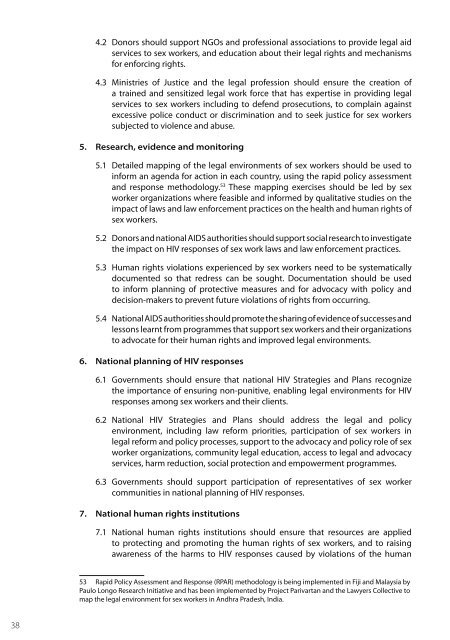SEX WORK AND THE LAW - HIV/AIDS Data Hub
SEX WORK AND THE LAW - HIV/AIDS Data Hub
SEX WORK AND THE LAW - HIV/AIDS Data Hub
Create successful ePaper yourself
Turn your PDF publications into a flip-book with our unique Google optimized e-Paper software.
4.2 Donors should support NGOs and professional associations to provide legal aid<br />
services to sex workers, and education about their legal rights and mechanisms<br />
for enforcing rights.<br />
4.3 Ministries of Justice and the legal profession should ensure the creation of<br />
a trained and sensitized legal work force that has expertise in providing legal<br />
services to sex workers including to defend prosecutions, to complain against<br />
excessive police conduct or discrimination and to seek justice for sex workers<br />
subjected to violence and abuse.<br />
5. Research, evidence and monitoring<br />
5.1 Detailed mapping of the legal environments of sex workers should be used to<br />
inform an agenda for action in each country, using the rapid policy assessment<br />
and response methodology. 53 These mapping exercises should be led by sex<br />
worker organizations where feasible and informed by qualitative studies on the<br />
impact of laws and law enforcement practices on the health and human rights of<br />
sex workers.<br />
5.2 Donors and national <strong>AIDS</strong> authorities should support social research to investigate<br />
the impact on <strong>HIV</strong> responses of sex work laws and law enforcement practices.<br />
5.3 Human rights violations experienced by sex workers need to be systematically<br />
documented so that redress can be sought. Documentation should be used<br />
to inform planning of protective measures and for advocacy with policy and<br />
decision-makers to prevent future violations of rights from occurring.<br />
5.4 National <strong>AIDS</strong> authorities should promote the sharing of evidence of successes and<br />
lessons learnt from programmes that support sex workers and their organizations<br />
to advocate for their human rights and improved legal environments.<br />
6. National planning of <strong>HIV</strong> responses<br />
6.1 Governments should ensure that national <strong>HIV</strong> Strategies and Plans recognize<br />
the importance of ensuring non-punitive, enabling legal environments for <strong>HIV</strong><br />
responses among sex workers and their clients.<br />
6.2 National <strong>HIV</strong> Strategies and Plans should address the legal and policy<br />
environment, including law reform priorities, participation of sex workers in<br />
legal reform and policy processes, support to the advocacy and policy role of sex<br />
worker organizations, community legal education, access to legal and advocacy<br />
services, harm reduction, social protection and empowerment programmes.<br />
6.3 Governments should support participation of representatives of sex worker<br />
communities in national planning of <strong>HIV</strong> responses.<br />
7. National human rights institutions<br />
7.1 National human rights institutions should ensure that resources are applied<br />
to protecting and promoting the human rights of sex workers, and to raising<br />
awareness of the harms to <strong>HIV</strong> responses caused by violations of the human<br />
53 Rapid Policy Assessment and Response (RPAR) methodology is being implemented in Fiji and Malaysia by<br />
Paulo Longo Research Initiative and has been implemented by Project Parivartan and the Lawyers Collective to<br />
map the legal environment for sex workers in Andhra Pradesh, India.<br />
38
















